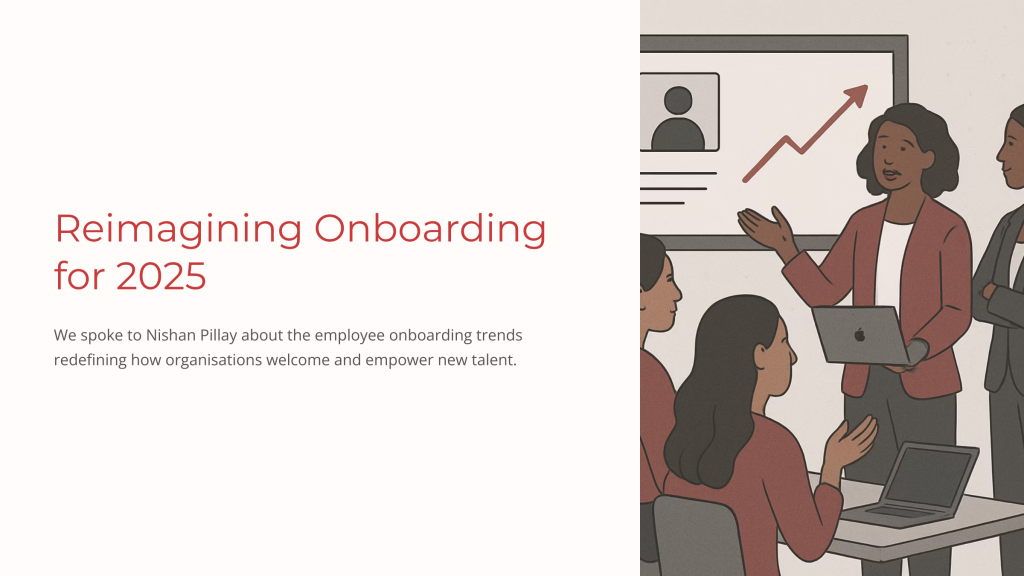
The world of work has undergone a seismic shift—and so has the way organisations bring people into their culture. What was once referred to as “induction” has evolved into something far more holistic: employee onboarding eLearning that reflects the complexity of today’s hybrid, multigenerational, and digitally-enabled workplace.
To unpack what’s next in onboarding and the future of corporate training, we spoke to Nishan Pillay, MD in Employee Benefits at ASI Financial Services.
From Induction to Immersion: The Rise of Experiential Onboarding
Traditional induction days—think policy briefings, PowerPoint presentations, and rushed office tours—are rapidly being replaced by immersive onboarding experiences that prioritise connection over compliance.
In 2025, organisations are shifting their focus from passive information delivery to active participation, recognising that how someone feels during their first days often shapes how they perform in the long term.
Nishan points out that even the terminology marks a cultural shift:
“It used to be called induction… almost military rules. The shift to calling it onboarding means we’re doing this together.”
That sense of mutual engagement is driving companies to design onboarding experiences that are not only informative but emotionally resonant. Rather than a one-size-fits-all orientation, today’s approaches integrate informal meetups, collaborative games, team-based challenges, and even workplace treasure hunts. These immersive tactics help new employees build relationships, absorb cultural cues, and feel seen as individuals—not just job titles.
Personalisation for a Multigenerational Workforce
“For the first time ever, we’ve got five generations working… The question is, how do you tailor the content for that?”
For the first time in history, five generations are co-existing in the workplace—each bringing unique communication styles, technological fluency, and learning preferences. From Gen Z’s demand for bite-sized, interactive content to Baby Boomers’ preference for clarity and structure, a one-size-fits-all approach to onboarding no longer meets the mark. In 2025, the trend is clear: personalisation isn’t a luxury—it’s a necessity.
Digital tools make it possible to adapt onboarding content by role, demographic, or even communication preference. For younger employees, this might mean interactive microlearning modules, gamified quizzes, or short-form videos with a conversational tone. For older employees, content may need to be more structured—perhaps with written guides, voice notes, or scenario-based simulations that provide deeper context.
Personalisation also enhances inclusion. Neurodiverse learners, second-language speakers, and remote employees all benefit when content is designed with flexibility and accessibility in mind. Through adaptive pathways, branching logic, and AI-enabled content delivery, onboarding can now be tailored to each learner’s pace, background, and goals.
The Power of Journey-Based Employee Onboarding eLearning
Onboarding is a continuous journey that unfolds over weeks and months, not hours. In 2025, leading organisations are replacing linear induction sessions with multi-touchpoint onboarding journeys that reinforce learning (especially for crucial info like benefits and policies), build connection, and gradually embed new hires into the organisational culture.
Nishan explains the shift:
“Journeys allow you to reinforce and repeat information that’s absolutely crucial… It could include a walkthrough of the building, a lunch with your EXCO, dialogue or online modules—onboarding becomes an actual process.”
This approach moves beyond front-loading information in a single session and instead paces learning across the first week, the first 90 days, and even the first year. Each stage is designed to align with a new hire’s evolving needs—from navigating logistics and systems to understanding cultural nuances and building cross-functional relationships.
Human + Digital: Striking the Right Balance
In the era of AI, automation, and remote work, the most effective onboarding strategies blend the efficiency of technology with the warmth of human connection. The challenge for 2025 isn’t choosing between digital or in-person—it’s designing an experience that leverages the strengths of both.
Nishan highlights two key roles of digitisation in onboarding:
“One is being able to scale… you can get consistent content to a large number of people. The other is personalisation—because you can tailor pieces of content through automation, like smart decision trees or chatbots.”
But automation alone isn’t enough. To truly engage employees, organisations must embed authentic human touchpoints. That might look like a virtual welcome coffee with a team leader, a buddy system that supports relationship-building, or a lunch with executive leadership that signals transparency and accessibility.
As Nishan puts it:
“A leader can say they’ve got an open-door policy, but that doesn’t create accessibility. You have to design it into the culture.”
Smart Use of Data and Feedback Loops
Nishan explains the value of data in reshaping onboarding:
“A bunch of leaders sit in a room and decide what people need to know—but there’s often no feedback loop to say, is it working? Are people productive? Do they understand the culture?”
Effective onboarding doesn’t stop at delivery. It evolves through analysis—tracking engagement metrics, learner satisfaction, knowledge retention, and time-to-productivity. These insights help HR and L&D teams refine content, identify gaps, and adjust formats for different audiences. More importantly, they enable a shift in mindset: treating new employees not just as recruits, but as internal customers whose experience matters deeply.
Reimagine Onboarding with Purpose
The new hire orientation trends shaping 2025—from journey-based learning and generational personalisation to AI-powered content and feedback-driven design—are redefining what it means to truly welcome someone into an organisation.
Now is the time for HR leaders, L&D professionals, and business decision-makers to elevate onboarding from a process to a purposeful experience. One that connects new hires not just to the systems and policies—but to the values, people, and vision that make your organisation thrive.
Anderson Studios specialises in designing creatively inspired employee onboarding eLearning solutions that are grounded in evidence, fuelled by insight, and tailored for impact.
Let’s co-create a journey that sets your people—and your organisation—up for long-term success.
Get in touch with Anderson Studios today.

